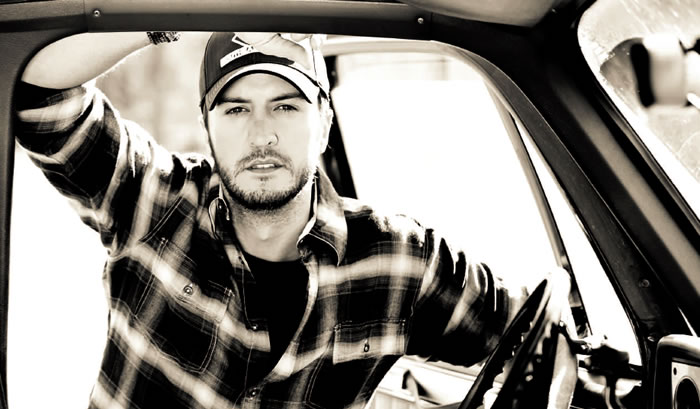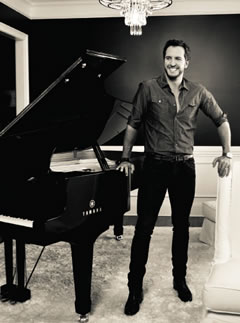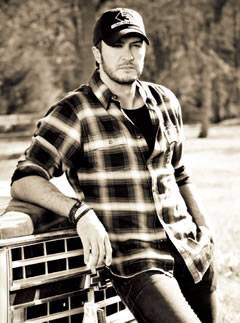


WHEN SINGER-SONGWRITER LUKE BRYAN FIRST ARRIVED IN NASHVILLE in late 2001, he wasted no time showcasing his considerable talents. He immediately got to work networking, songwriting, demoing, and weaving himself inextricably into the fabric of Music Row. After only a few months, his efforts paid off with a songwriting deal. And just a few years later, Bryan was recording and performing his own hits—including six #1 singles—and winning every country music award in sight. In 2012 alone, he won 11 major awards including a record nine wins at the American Country Awards as well as his first American Music Award.
Luke is grateful for all this acclaim, if not particularly surprised by his success. “I’ve worked hard,” he reflects. “In fact, I’ve worked my tail off! I just knew where to target my efforts.” We spoke with this hardworking superstar on the eve of his first major headlining tour, supporting his most recent platinum release, 2011’s tailgates & tanlines.
YOU STARTED OUT AS A SONGWRITER. WHAT ARE SOME OF THE TRICKS OF THE TRADE YOU LEARNED THAT YOU STILL USE TODAY?
I definitely look back to my early years of songwriting as a big reason why I’ve been able to be here. Any time you hone your songwriting skills, it can make you a better recording artist. It can help you write great songs and find great songs. But I don’t really necessarily know any “tricks of the trade.” I just think your instincts as a writer get better. It’s the same whenever you try to be a pro at anything: The more you learn about it, and the more you work at the craft, the better you can get. If you’ve worked hard at writing, you ought to have a better shot at knowing a great song when you hear it.

HOW DOES WRITING FOR OTHER PEOPLE DIFFER FROM WRITING FOR YOURSELF?
When I’m writing for me, I know what I need on my albums. I know the direction I want to take, and can pinpoint certain things that I want to do. I used to just write a lot, as I was learning who I was. But as I’ve found out who I am as an artist, I’m able to write toward something. The main thing is that it all starts with a great idea, or a great melody, or a great musical hook, and then you try to tie all that together.
WHEN YOU MOVED TO NASHVILLE, YOU FOUND A NICHE PRETTY QUICKLY. WHAT DID YOU DO TO ESTABLISH YOURSELF WHEN YOU FIRST ARRIVED?
I didn’t really know anybody. I didn’t have any contacts that could do anything for me. But I was 25 when I moved to town, and had already gotten a college degree, and I was pretty mature. The main thing for me was just focus on Music Row, focus on writing great songs and trying to get my songs in front of the right people that could hear them and get them on the radio, and hopefully sign me to a deal one day. So I got on Music Row and just started networking. Meeting writers and publishers, and when publishers started hearing my songs, taking a meeting and going in there and playing music for them. And as the songs got better, people started paying attention to what I was doing. Roger Murrah offered me my first publishing deal, and that's how it all got started.
In Nashville, it’s not hard to throw a rock and hit a songwriter. It’s a tight-knit group, and a lot of the writing is done right there on Music Row. So you move to town and try to get in the game with all the big writers. I think that’s what makes Nashville songs really great—it’s a real competitive market, and that drives for better songs.
WHAT INITIALLY MADE YOU WANT TO CREATE MUSIC PROFESSIONALLY?
That’s the main thing: I just loved it. I never was truly at peace or truly happy unless I was on a stage performing and singing. I never considered it a job, and it’s something that’s just so gratifying. And any time you’re blessed to do something you love, and can make a little money in it, and feel like you’re making a difference, I think that’s pretty special. I never really approached it to make money. I just approached it to try to put smiles on fans’ faces and have a good time onstage with my band and my crew and my guys. That’s always been the mentality. And now more than ever, I still enjoy it.
I never was truly at peace or truly happy unless I was on a stage performing and singing.
YOU’VE BEEN PRAISED FOR YOUR LYRICS. WHAT DO YOU THINK ARE THE MOST IMPORTANT THINGS TO KEEP IN MIND WHEN WRITING LYRICS?
Just to connect with the audience and sound authentic and real. Make it speak to your audience, and sound like somebody that a country-music audience wants to hear. Try to do things that are relatable, about situations that people have been in. I think that’s what makes for the best songs. When people hear a song that they can really relate to, or one that’s about something that’s part of their lives, they gravitate to it. As a writer, if you can make yourself feel like one of them, people really respond to that.

THE LAST FEW YEARS HAVE BROUGHT YOU A LONG STRING OF AWARDS. IS THERE ONE AWARD AMONG THEM THAT MEANS THE MOST TO YOU?
That’s hard to say. I’ve been really fortunate in winning a lot of fan-voted awards. I think any time the fans are directly voting for you and giving you really, really amazing awards, that’s about as special as it gets. My first New Artist award at the ACMs [Academy of Country Music Awards] was a huge deal for me—that was a big moment. And obviously all the ACA awards that I won this year, and winning Artist of the Year. All those are amazingly gratifying and awesome. It’s just really gratifying that there are a lot of fan-voted awards that I’ve been able to take home.
YOU’RE BEST KNOWN AS A GUITARIST, BUT YOU ALSO PLAY PIANO.
I had a piano in my room growing up, and I always bounced back and forth between piano and guitar. I’m a better guitar player, but I can get around pretty well on the piano. As for writing songs, they can inspire you in different ways. They spark different things, and take you to different places. I’m always going to lean toward writing a good ballad on piano and maybe a little something more up-tempo on guitar. And as a showman, people like to see you step out there and maybe do a little something different on piano. I think fans enjoy seeing multiple sides of an artist.
YOU’RE ABOUT TO GET A YAMAHA C7 GRAND PIANO. WHAT ARE YOU GOING TO USE IT FOR?
The day I get my C7 at the house, my wife will probably have to tranquilize me to get me off that thing! I don’t really get into the whole studio world at the house—I kind of enjoy driving into the studio and working, almost like going into the office, and leaving it there. Most of the studios in Nashville have Yamaha C7s. They’re probably the most-recorded country piano—their sound is synonymous with what you hear on country radio. They really cut through, and I think that’s why they record so well. The notes just really pop in the speakers and pop when you’re recording them. So when I get my piano at the house, I will write primarily on it. And hopefully just work on stuff and constantly try to become a better player.
I’m also playing Yamaha stuff out on the road—the CP300—and I keep another keyboard in the back of my bus to write on the road a little bit. I just love the basic piano sounds, the grand piano. Hauling a real piano and having it tuned every day can get a little bit frustrating, but we don’t ever have a bit of trouble with our Yamaha on the road, and it sounds great night in and night out. It’s been a great piano for us.
YOU’RE ABOUT TO START YOUR FIRST HEADLINING TOUR. WHAT ARE YOU LOOKING FORWARD TO THE MOST?
We’re rehearsing and getting ready for that, so we’re really, really, really excited about it. For the first time we get to call all the shots and dictate everything. It’s fun to design the set like you want to, and really have time to entertain your crowd like you want to. I’ll make it my own little playground, make it fun for my fans, and hopefully leave them having never quite seen anything so enjoyable. I want them to forget about everything they’ve got going in their lives and get wrapped up in the moment, and kind of go on an amusement-park ride for a little bit. Enjoy the ups and downs, and sing along, and drink some beer and hug on whoever they’re with. I just want them to leave their troubles behind, and know deep down that their money’s well spent at this show, and they had a great time.
(Photography Credit: Rob Shanahan)
























